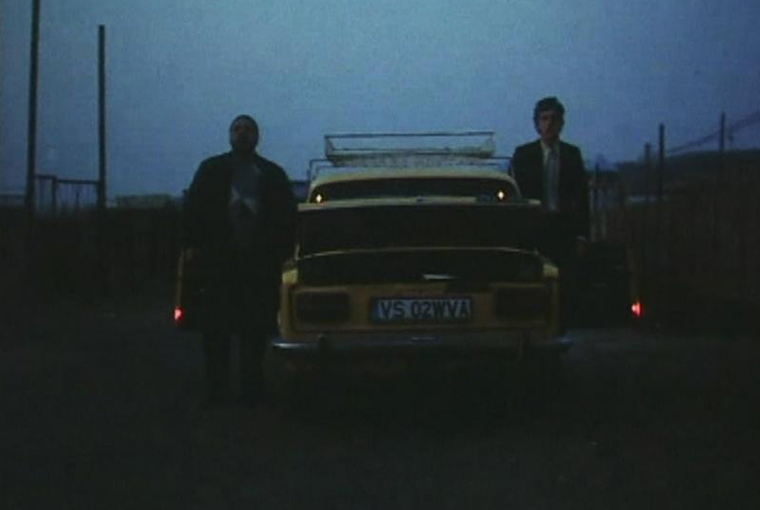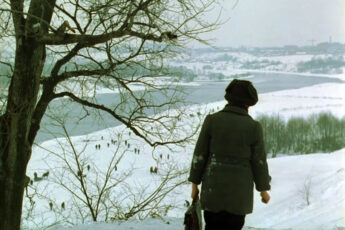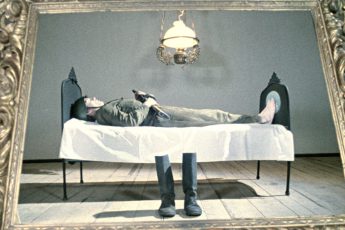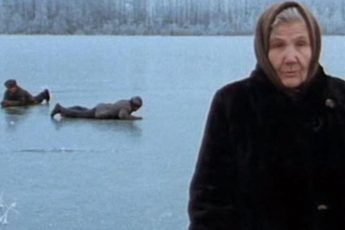One more Sho(r)t for the Road
Corneliu Porumboiu’s Gone With the Wine (Pe aripile vinului, 2002) & A Trip to the City (Calatorie la oras, 2003)
Vol. 55 (July 2015) by Geli Mademli
Film scholars tend to approach the early work of directors with the curious eye of a microbiologist, examining their first meditations on form and meaning as new lifeforms and articulations of a Darwinian theory of evolution: the stronger cinematic elements will get to survive and dominate over a grand oeuvre. In the case of the early films of Corneliu Porumboiu, it is possible for a keen viewer to follow this method; but then again, it is most probable that a retrospective reading of his films – shorts that can fit all sorts of contemporary antinomies in a shot glass – will diminish their intoxicating and exhilarating power.
Gone With the Wine (2002) and A Trip to the City (2003) were shot in sequence during Porumboiu’s studies at the I.L. Carnegie University in Bucharest, and to this day they are viewed together for many different reasons. In the first film, a young student attempts to escape his everyday life in the village by applying for a job on an oil rig in England, but he doesn’t pass the medical tests. In the second film, a young teacher (played by the same actor, Constantin Dita) tries to provide his school with a high-end computer by traveling to the city under the auspices of the mayor. But he, too, fails to complete his mission. In the first film, the cosmos of a public hospital, in which pimps maintain the physical condition of their protegees, expels the young man even though he’s not looking for a remedy, but merely for proof of health and sanity. In the second film, a public organization celebrating “854 years of history and civilization” appears to welcome the newcomers from the neighboring village until it emerges that they are not over-eager to participate in the celebrations.
Cars moving endlessly on unknown roads, people sitting permanently on someone else’s wheel, vehicles crashing into each other for no obvious reason, people using public transport to carry their private burdens – the heroes in Porumboiu’s early films are not destined for or addicted to failure, however appealing the rhetoric of defeat might be in a society that dwells on uncertainty. Rather, they are anxious to make their own way to what is uniformly conceived of as the road to ‘progress,’ ‘growth,’ or ‘the West,’ drawing a narrow path where others use the motorway. Between the cruel dogmatism of the Ceaușescu regime and the imperatives of the freedom of will that have flooded post-communist societies, the necessity to dissolve binary schemes becomes ever more intense.
Porumboiu’s own vehicle is his camera. Interestingly, at this stage of his career the camera is still a moving one and hasn’t yet settled on the static angles and austere geometry that would become characteristic of his visual signature. Notably, contrasting schemas are omnipresent in the background: among others, the disturbing stillness of the countryside competes with urban bewilderment; women appear either as oppressive mothers or as depressive escorts; ordinary people are forced to comply with the vices of bureaucrats; technology is isolated while nature is pervasive, as men indulge in animality more often than do the chicken, geese and pigs that also enter the frame.
That said, Porumboiu does not seem to believe that the dynamic tension between opposite poles is the reason the big wheel keeps spinning. In Gone With the Wine, a drunkard in the bus mumbles his words of wisdom: “As the priest says, if you take life seriously, you can’t fail.” But then, in Trip to the City, when the teacher is asked what computers do, the teacher points to its ability to create ‘virtual worlds.’ This possibility of creating a world that is different but not radically opposed to the one we live in – the slight twist in our regular perspective that art achieves more effectively than alcohol – and this power of the virtual have nothing to do with software or hardware: Porumboiu’s virtual worlds are open and unsolvable crosswords that relieve our angst to succeed in a world that is always out of frame.




Leave a Comment